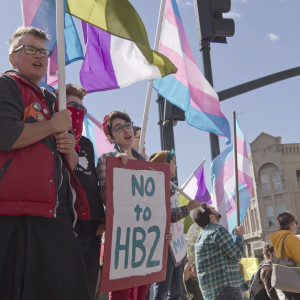Going to the bathroom has suddenly become a political act for transgender people. In response to growing public acceptance of transgender people and increasing equality for LGBT Americans, legislators in states across the country have introduced about 200 anti-LGBT bills this year designed to legalize and foster discrimination.
Dozens of the bills under consideration are so-called “bathroom bills,” which seek to exclude transgender people from accessing vital, daily facilities like restrooms. Recently, North Carolina became the first state to adopt such legislation. The legislation, HB 2, was pushed through after the city of Charlotte adopted LGBT-inclusive nondiscrimination protections that would have protected LGBT individuals from discrimination in city contracting and public accommodations.
The North Carolina bill included several harmful components — including far-reaching negative consequences for LGBT people, low-income workers, people of color and women — by eliminating the ability of localities to adopt LGBT protections, set livable wages, and eliminating the right to sue for all protected communities in state courts. But the public centerpiece of the legislation was its bar on most transgender people from using restrooms consistent with their gender identity in any government facility, including schools.
Since passage of HB 2, the outcry has been loud and swift from across the country. Businesses have canceled expansions or events planned in North Carolina, threatening more than half a billion dollars in economic activity in the state.
Proponents of anti-transgender legislation claim that action is necessary out of a concern for public safety. These lawmakers disingenuously argue that allowing transgender people to continue to use restrooms consistent with their gender — without fear of discrimination or harassment — will suddenly lead to people pretending to be transgender in order to commit harmful acts.
While bathrooms remain vulnerable spaces for many people, transgender and non-transgender alike, these fears are completely unfounded. Eighteen states, as well as 200 cities, protect transgender residents from discrimination, including in restrooms. In the years — and, in some instances, decades — since transgender-inclusive nondiscrimination protections have been implemented, those laws have never allowed for or facilitated violence in public restrooms.
Illegal behavior is still illegal, and for those determined to harm others, the presence or lack of non-discrimination protections are irrelevant.
That is why leading law enforcement officials in those communities have come out against bills like HB 2. In fact, more than 250 of the nation’s leading sexual assault and domestic advocacy organizations recently voiced their support for protecting transgender people in restrooms. None of these officials or organizations would support legislation that had even the smallest chance of increasing the risk of assault, and they know that efforts to demonize or target an already vulnerable group of people actually serve to perpetuate violence.
Put simply, barring transgender people from restrooms consistent with their gender identity doesn’t help anyone, and continuing to allow transgenderpeople to access those restrooms doesn’t hurt anyone.
Elected officials in North Carolina know this. Yet they continue to capitalize on the public’s misunderstanding of transgender identities and understandable sense of vulnerability in bathrooms to legalize discrimination and score political points on the backs of a marginalized community.
Efforts to bar transgender people from restrooms are nothing more than an attempt to codify discrimination before our country advances any further on transgender equality. Bills like HB 2 seek to legislate away transgender people from public life — if you can’t use appropriate restrooms, it becomes much harder to go to work, to school or to participate fully in public life.
As a transgender person, I know this firsthand. Recently, in a small act of political protest, I posted a selfie of myself alone in a women’s restroom that I was technically banned from being in under North Carolina’s HB 2. The post went viral.
While the picture was met with overwhelming support, the negative comments also came flooding in. Some recited the lies spread by anti-transgender politicians, but just as many were far more vicious. I was met with a barrage of people not only denying my womanhood, but even more telling me to kill myself or threatening to assault or murder me.
This is the reality for transgender people that too many politicians have not only ignored, but also fostered. Since passage of HB 2, suicide hotlines have reported an increase in calls from transgender North Carolinians.
As a country, we are better than this. Instead of moving backward, we should expand opportunity and protections by repealing hateful laws and passing comprehensive LGBT nondiscrimination laws at the local, state, and federal level.

